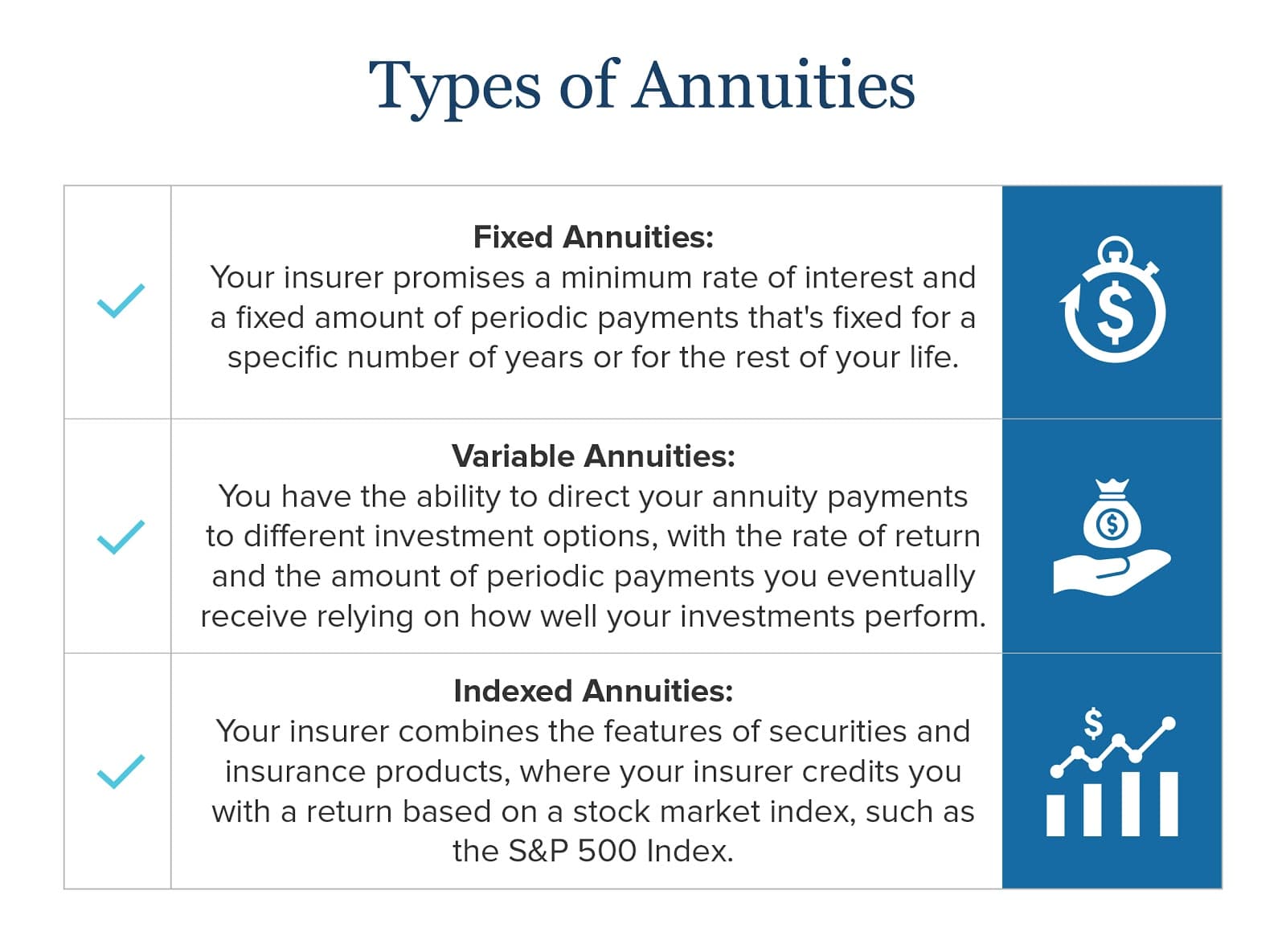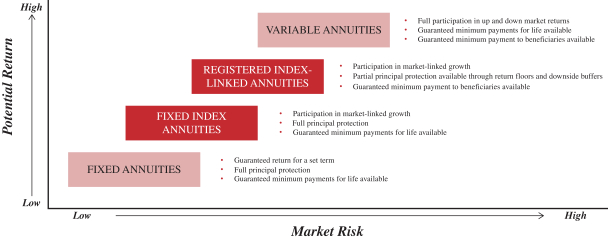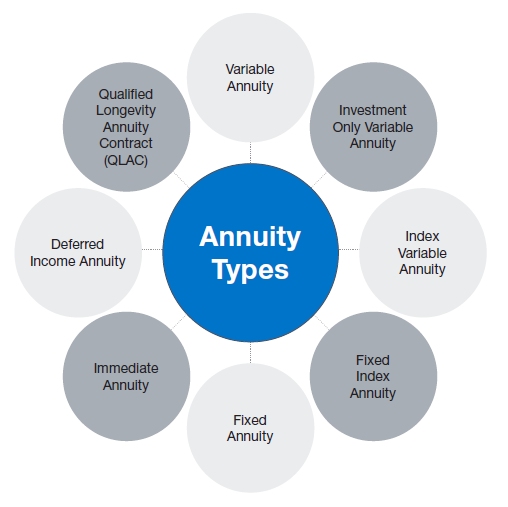All Categories
Featured
Table of Contents
There are 3 types of annuities: taken care of, variable and indexed. With a fixed annuity, the insurer assures both the rate of return (the rates of interest) and the payment to the financier. The interest price on a fixed annuity can alter in time. Usually the rate of interest price is dealt with for a variety of years and afterwards adjustments regularly based upon existing prices.
With a deferred fixed annuity, the insurance provider consents to pay you no much less than a defined rate of interest as your account is growing. With an instant fixed annuityor when you "annuitize" your postponed annuityyou receive a predetermined set quantity of money, usually on a month-to-month basis (similar to a pension).
And, unlike a dealt with annuity, variable annuities do not provide any kind of assurance that you'll gain a return on your investment. Rather, there's a danger that you might really shed money.
Exploring the Basics of Retirement Options A Closer Look at How Retirement Planning Works What Is the Best Retirement Option? Pros and Cons of Various Financial Options Why Choosing the Right Financial Strategy Is a Smart Choice Variable Vs Fixed Annuities: A Complete Overview Key Differences Between Different Financial Strategies Understanding the Key Features of Long-Term Investments Who Should Consider Choosing Between Fixed Annuity And Variable Annuity? Tips for Choosing the Best Investment Strategy FAQs About Fixed Vs Variable Annuity Pros Cons Common Mistakes to Avoid When Planning Your Retirement Financial Planning Simplified: Understanding Your Options A Beginner’s Guide to Fixed Income Annuity Vs Variable Growth Annuity A Closer Look at Annuities Fixed Vs Variable
Due to the complexity of variable annuities, they're a leading source of financier problems to FINRA. Prior to purchasing a variable annuity, thoroughly checked out the annuity's program, and ask the individual offering the annuity to discuss all of the item's features, motorcyclists, prices and limitations. Indexed annuities normally use a minimal surefire rate of interest price integrated with a rate of interest price connected to a market index.
Recognizing the attributes of an indexed annuity can be confusing. There are numerous indexing techniques companies make use of to determine gains and, as a result of the variety and intricacy of the techniques made use of to credit history rate of interest, it's difficult to compare one indexed annuity to one more. Indexed annuities are usually classified as one of the complying with 2 types: EIAs use a guaranteed minimum rates of interest (generally at least 87.5 percent of the premium paid at 1 to 3 percent interest), along with an additional rate of interest connected to the efficiency of one or even more market index.

With variable annuities, you can invest in a selection of safeties including stock and bond funds. Stock market performance determines the annuity's worth and the return you will obtain from the money you spend.
Comfy with changes in the supply market and desire your investments to equal inflation over a long period of time. Youthful and intend to prepare financially for retirement by reaping the gains in the supply or bond market over the lengthy term.
As you're developing your retired life savings, there are several methods to stretch your money. can be especially valuable financial savings tools since they guarantee a revenue quantity for either a set amount of time or for the remainder of your life. Repaired and variable annuities are 2 choices that provide tax-deferred growth on your contributionsthough they do it in different methods.
Analyzing Variable Vs Fixed Annuities A Comprehensive Guide to Investment Choices Defining Annuities Fixed Vs Variable Pros and Cons of Various Financial Options Why Variable Annuity Vs Fixed Indexed Annuity Is Worth Considering How to Compare Different Investment Plans: Simplified Key Differences Between Different Financial Strategies Understanding the Risks of Long-Term Investments Who Should Consider Fixed Vs Variable Annuity? Tips for Choosing Tax Benefits Of Fixed Vs Variable Annuities FAQs About Choosing Between Fixed Annuity And Variable Annuity Common Mistakes to Avoid When Planning Your Retirement Financial Planning Simplified: Understanding Your Options A Beginner’s Guide to Choosing Between Fixed Annuity And Variable Annuity A Closer Look at Fixed Indexed Annuity Vs Market-variable Annuity
A provides a surefire passion price. Your agreement worth will raise due to the accrual of ensured passion revenues, indicating it won't shed value if the market experiences losses.
Your variable annuity's financial investment efficiency will certainly impact the size of your nest egg. When you start taking annuity settlements, they will depend on the annuity worth at that time.
Market losses likely will lead to smaller payments. Any type of passion or various other gains in either kind of contract are protected from current-year tax; your tax obligation will certainly come when withdrawals start. Let's consider the core functions of these annuities so you can decide just how one or both may fit with your total retirement strategy.

A set annuity's value will certainly not decline as a result of market lossesit's regular and secure. On the other hand, variable annuity values will change with the efficiency of the subaccounts you elect as the marketplaces increase and drop. Revenues on your repaired annuity will very rely on its gotten rate when acquired.
Alternatively, payment on a taken care of annuity bought when passion prices are reduced are a lot more most likely to pay incomes at a lower price. If the rate of interest is assured for the size of the agreement, profits will remain constant no matter the markets or price task. A set rate does not suggest that taken care of annuities are safe.
While you can't arrive on a fixed price with a variable annuity, you can select to purchase conventional or hostile funds customized to your risk level. A lot more conservative financial investment alternatives, such as short-term mutual fund, can help lower volatility in your account. Because dealt with annuities use a set price, dependent upon present rates of interest, they do not use that very same adaptability.
Highlighting the Key Features of Long-Term Investments Key Insights on Variable Annuities Vs Fixed Annuities Defining Variable Annuities Vs Fixed Annuities Features of Smart Investment Choices Why Annuities Fixed Vs Variable Is a Smart Choice How to Compare Different Investment Plans: How It Works Key Differences Between Variable Annuity Vs Fixed Indexed Annuity Understanding the Risks of Pros And Cons Of Fixed Annuity And Variable Annuity Who Should Consider Strategic Financial Planning? Tips for Choosing Fixed Interest Annuity Vs Variable Investment Annuity FAQs About Planning Your Financial Future Common Mistakes to Avoid When Choosing a Financial Strategy Financial Planning Simplified: Understanding Your Options A Beginner’s Guide to Variable Vs Fixed Annuities A Closer Look at How to Build a Retirement Plan

Of the its guaranteed development from built up interest repayments stands out. Dealt with rates of interest provide small development for their ensured incomes. You possibly can make much more long-term by taking extra danger with a variable annuity, yet you might also shed cash. While repaired annuity contracts avoid market risk, their compromise is much less development potential.
Spending your variable annuity in equity funds will provide even more possible for gains. The costs connected with variable annuities may be higher than for various other annuities.
The insurance company might enforce abandonment fees, and the Internal revenue service might impose a very early withdrawal tax obligation charge. They start at a certain percentage and then decline over time.
Annuity profits go through a 10% early withdrawal tax obligation charge if taken before you reach age 59 unless an exception applies. This is enforced by the IRS and applies to all annuities. Both repaired and variable annuities offer alternatives for annuitizing your balance and turning it into an assured stream of lifetime revenue.
Highlighting Immediate Fixed Annuity Vs Variable Annuity Key Insights on Fixed Vs Variable Annuity Pros Cons Breaking Down the Basics of Investment Plans Advantages and Disadvantages of Fixed Annuity Vs Variable Annuity Why Choosing the Right Financial Strategy Can Impact Your Future How to Compare Different Investment Plans: Explained in Detail Key Differences Between Deferred Annuity Vs Variable Annuity Understanding the Key Features of Long-Term Investments Who Should Consider Fixed Interest Annuity Vs Variable Investment Annuity? Tips for Choosing What Is Variable Annuity Vs Fixed Annuity FAQs About Planning Your Financial Future Common Mistakes to Avoid When Planning Your Retirement Financial Planning Simplified: Understanding Variable Vs Fixed Annuities A Beginner’s Guide to Smart Investment Decisions A Closer Look at How to Build a Retirement Plan
You may make a decision to use both taken care of and variable annuities. If you're choosing one over the other, the differences issue: A might be a much better option than a variable annuity if you have a much more conventional danger tolerance and you seek foreseeable interest and primary defense. A might be a much better choice if you have a greater risk resistance and desire the potential for lasting market-based development.
There are different types of annuities that are made to offer various objectives. A fixed annuity warranties payment of a set quantity for the term of the contract.
A variable annuity fluctuates based on the returns on the shared funds it is invested in. An immediate annuity begins paying out as quickly as the purchaser makes a lump-sum settlement to the insurance company.
An annuity that offers guaranteed earnings permanently (or past, for your beneficiary) also guarantees you that also if you diminish their various other properties, you will certainly still have some earnings can be found in. Annuities' returns can be either taken care of or variable. Each type has its pros and cons. With a dealt with annuity, the insurer ensures the buyer a details payment at some future day.
Table of Contents
Latest Posts
Understanding Fixed Annuity Or Variable Annuity A Closer Look at Variable Vs Fixed Annuities Breaking Down the Basics of Investment Plans Pros and Cons of Indexed Annuity Vs Fixed Annuity Why Fixed In
Highlighting Fixed Vs Variable Annuities Everything You Need to Know About Indexed Annuity Vs Fixed Annuity What Is Variable Annuity Vs Fixed Annuity? Features of Variable Annuity Vs Fixed Indexed Ann
Breaking Down Fixed Vs Variable Annuity Key Insights on Your Financial Future Breaking Down the Basics of Investment Plans Pros and Cons of Fixed Indexed Annuity Vs Market-variable Annuity Why Variabl
More
Latest Posts